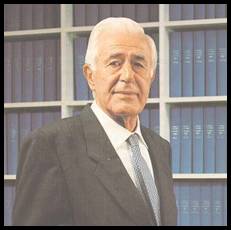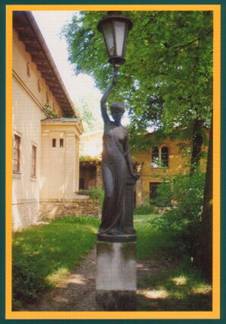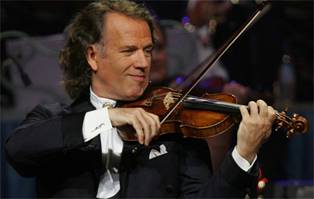by John Milfull
© all rights reserved
In 1994, I stood down after nine years as Dean of Arts and Social Sciences at UNSW, partly because I was convinced of the Jack Mundey thesis that senior administrators should get used to living with others’ mistakes after some years of imposing their own, but also because I had set myself the pre-retirement goal of realising my vision of European Studies at NSW.
The foundations had already been laid, enrolments in our new undergraduate program were excellent, my contacts as Dean were helpful in winning cross-Faculty support, and the constellations seemed good: Aneurin Hughes was making his initial round of visits as Head of the EC Delegation, promising all kinds of enticing rewards for those who organised Schuman Lectures, waved the flag and played the anthem on Europe Day and hosted a European Documentation Centre. Of course we complied – we even, I think, won the race – but oddly enough, the rewards never seemed to materialise.
Be that as it may, the Schuman lectures (later renamed Europa lectures when I grew tired of being accused of misspelling poor Robert’s name) were an unambiguous and highly gratifying success. For the first, I was able to persuade ex-Prime Minister Keating to speak on A Prospect of Europe ; it became an oddly hypnotic mix of regret for his demise, Prussian garden art and fine music by the Australia Ensemble, our resident chamber group. It was the kind of emotive farewell he deserved and had to have. When Giuliano Amato lectured to us six years later in Keating’s presence, I could not resist the comment that it was much easier to become ex-Prime Minister in Italy than in Australia – Amato had even managed it twice. For Keating there was no contradiction between engagement with Asia and his own deep personal ties with the arts and politics of Europe.
Even the Irish were on side. The following year, Irish Ambassador Richard O’Brien gave a rousing speech on the Good Friday breakthrough to a crowd of cheering Celts; here too, there was a natural blend of words and music, Irish melodies bridging an unhappy past and a happier future. Keating sent his congratulations.
In the same year, my colleagues in Law had the brilliant idea of inviting Judge Federico Mancini of the European Court of Justice to act as Visiting Professor at UNSW during his summer holidays. As my friend Gerlando Butti of the Italian Institute of Culture later informed me, “every Italian has relatives in Australia “, but to my astonishment and admiration, Mancini brought an enthusiasm and warmth to his classes and lectures as adjunct professor which captivated his students and colleagues. I still remember sitting with him at Café Otto in Glebe Point Rd. on a particular balmy Sydney spring day, exploring the idea of a Schuman lecture for 1999 on The Italians in Europe. Not only did he accept, he put an enormous amount of effort into producing a draft, complete with supporting quotes – born diplomat that he was – from Robert Dessaix, Martin Krygier and even John Milfull. The reality was that Federico – we were soon on first name terms – had a remarkable gift for friendship which even survived correspondence. It came as no surprise to me that, at the end of his lecture, he wrote that Italy’s real gift to Europe might be to “contaminate” EU proceedings with Italian warmth and charm. I was reminded of Bert Brecht’s affirmation, in his last poems, of Freundlichkeit (“friendliness”) as the chief and abiding joy of life.
It is hard to look back on that meeting and the planned lecture without a deep sense of nostalgia, even of loss. Postponed at first from concerns at his wife’s health, it was finally consigned to the realms of the might-have-been and the cemetery of print publication1 after his own totally unexpected death later that year. But the sadness goes deeper than that; Mancini’s lecture is full of post-Maastricht optimism, of pride and affection for Italy’s struggles to get its house in order to join the Euro, and of advocacy for a Europe which furthers the harmonisation of local and regional identities with a commitment to European citizenship and governance. It is a Europe in which the collapse or obsolescence of the fragile national constructions of the Italian past can be transformed into a positive advantage – an affirmation of federalism and integration which offers the prospect of tolerance, a broader understanding of democracy and of the efficient management of its economic basis.
What happened? Those amiable Italians who, Mancini wrote, “don’t mind who runs their economy, so long as it isn’t the Italians”, and whose prime virtues were wamth and humanity, deserted in droves to Silvio Berlusconi, a man with all the charm of a Telstra CEO in Australia, who not only owned a substantial slice of Italy but, as has now become clear, “ran it” into the ground. Forza Italia indeed: the succession of fouls became too blatant even for Roma fans, the boss was fired, leaving the unfortunate Olives of the centre-left to clean up again.
Not only that, but Romano Prodi, whose appointment as President of the European Commission from 1999 – 2004 had seemed to embody Mancini’s hopes for Italian participation in Europe, has once again had to patch together a fragile coalition, whose survival ironically depends on the vote of Italian expatriates in Australia. Berlusconi had falsely assumed that emigrants always favour the right. Like the unfortunate Joachim Murat, he was finally condemned by a law of his own making. Viva Fedi, viva Randazzo !! We seem back to Square One, and not only in Italy.
Prodi’s earlier successes at home were not replicated in Brussels; he returned with the stigma of having presided over a snowballing post-Maastricht malaise, which was to culminate in the rejection of the constitutional treaty in France and the Netherlands, an unresolved crisis in transatlantic relations and a mounting unease about the enlargement process. The press was unkind, assailing his lack of charisma and professorial verbosity, but perhaps his was a no-win situation. Giuliano Amato, who had followed him to Brussels as Vice President of the constitutional convention, was widely regarded as the “star” of proceedings, and matched Mancini’s criteria almost perfectly. Now he, too, is back in Rome, devoting his energies to stamping out hooliganism among the football fans whose local identities Mancini had wanted to preserve in a harmonised Europe and, no doubt, looking back on the years of work on the constitutional treaty with something approaching despair.
Amato took over Mancini’s position as adjunct professor at UNSW for a brief period between major “assignments”, and of course his appointment to the convention made him a most attractive choice for our interrupted series of Schuman/Europa lectures; Bronislaw Geremek, who, for some curious reason, had expressed his interest in combining a lecture with the award of an honorary doctorate was twice forced to cancel due to “a political crisis” in Poland, which I imagine to be a permanent state of affairs. The previous year, our friend and colleague Giuseppe Schiavone, he too visiting relatives in Australia, was kind enough, on Gerlando Butti’s mediation, to replace the postponed second coming of Geremek with a wide-ranging and highly informative lecture on European integration; I was well on the way to becoming an outed Italophile.
Giuliano Amato’s lecture was an outstanding success; a tour de force, delivered in perfect English without any visible notes, framed by a wonderful performance of Scarlatti sonatas on the fortepiano and an eloquent vote of thanks by German Ambassador Klaus Klaiber. Amato spoke beneath a projection of the ornate galleries of Pisa cathedral; I always tried to add some visual marker of the lecturer’s origins or interests. Later, he was kind enough to write to me that he had found the atmosphere both “solemn and very friendly”, which was all that I could have wished for. There was even a genuine moment of Mancinian “contamination”: after Christine Logan’s translucent Scarlatti sonatas, I confessed to the audience that, inhibited Anglo as I am, I had presented her bouquet of flowers in the Green Room, before the concert. Without further ado, Amato restored the natural order of things with a fatherly kiss on the cheek, which won the heart of the audience (and, I suspect, Christine) for ever.
It was as if the spontaneous friendship I’d formed with Mancini had simply been passed on, with the adjunct professorship, to Amato; he still finds time to respond to my e-mailed greetings, an avid user of aol.it. Yet somehow the memories of 2003 are almost as melancholy as those of Mancini. The “sensible compromise” Giuliano had tried to construct between Europe and Washington, his unbroken belief in the European Project, so reminiscent of Mancini’s deep commitment, seem to belong to some kind of world before the fall. What went wrong? Did Mancini’s Italian “good Europeans” suddenly turn into bad Europeans? Why did they turn from Amato and Prodi to Berlusconi? Whatever happened to the constitution and the “sensible compromise”?
I have to admit that, at the time, I was troubled by the rift between public and private in my extended conversation with Amato; “in private”, he left me in no doubt about his views on the Bush administration, US unilateralism and the invasion of Iraq. In the lecture, he was the spirit of reconciliation and fence-mending. It was a dualism he seemed to share with most European leaders, even perhaps Tony Blair, who papered over their private perceptions and the opinion polls in their countries with a bland reaffirmation of Atlantic fraternity and business as usual. Nor do I wish to idealise the “rebellion” of Chirac and Schroeder, much as I welcomed it at the time. But it’s clear to me that the failure to take a united and oppositional position on the Iraqi war and the deliberate splitting tactics of Aznar, Blair and their “New” European allies provoked an ongoing crisis in European affairs which shows no signs as yet of being resolved. Nicolas Sarkozy argues that “the no vote in the Netherlands and France was not responsible for the crisis in Europe, but rather that the crisis in Europe was responsible for the rejection of the constitution”2, and that seems to me an obvious truth.
It is an astonishing irony that those who are first to complain about Europe’s democratic deficit seem entirely untroubled by policies which are opposed by 70 or even 80 percent of their populations; the EU was founded to stop wars, not to wage them, and it ill behoves it to act as a staging point for US weapons of mass destruction against the civilian populations of former Yugoslavia and Iraq. The conflict cannot be reduced to a matter of style, a choice between negotiation and action, it goes to the heart of the concept of a just society.
Up till now, the EU has continued to exercise a formidable attraction to neighbouring states, and it is a serious error to see this attraction only in economic terms; it had just as much to do with the caring side of the social market economy and the whole project of European social democracy, to say nothing of the abiding promise of a common home which would make war unthinkable. This consensus is now under serious threat; whether it is the continuing progress of neo-liberal “rationalisation” or the mounting conviction that the process of enlargement has got out of control which has led to the rebellion of the electorate, it is clear that the rhetoric of harmony which for so long has dominated EU discourse is in urgent need of “refoundation”, of reestablishing connection with those it is meant to represent, of “articulating difference” (Homi Bhabha), not suppressing or ignoring it. The recent debate on the relevance of postcolonial studies to the situation in metropolitan Europe leads me to the obvious conclusion that external and internal affairs, like external and internal colonisation, are inseparable; Europe cannot participate in neo-colonial wars and expect to be spared the “colonial boomerang” of the excluded and voiceless in its own suburbs. A common foreign and security policy would need to begin at home, a few blocks away.
The question is not “who would want to die for Javier Solana?” as the Times quipped with customary Anglo xenophobia, but who would want to live for Europe, how the EU can recover the image of a society that people actually want to live in, and a world view which makes it possible. The Arab-Israeli conflict seeps through our suburbs, the war in Iraq determines the way young men and women think and act, “Middle Eastern” or not. There is a lot of rebuilding to do.
And yet: I can still not avoid the attraction of Mancini’s and Amato’s vision of Europe, its humanity and respect for diversity. But the constitution, however reasonable – even bland – it might seem, can do little to help. I suspect that the ultimate cause of its failure was its attempt to dissolve all difference into a level of generality which is more the problem than the solution. Europe has so much going for it, how can it market itself so ineptly? Why does it continue to chase the mirage of European identity when it should celebrate the wealth of traditions, cultures and landscapes it spans? Do Europeans need to feel “identical”, to conform to norms? May providence protect us from such an appalling outcome!
Vive le Rieu, or the Birth of Maastricht Man from the Spirit of the Waltz
Last year I attained brief notoriety by telling a Melbourne CERC conference that what the EU needed was not a constitution, but an events manager. It was an extreme position; I now see that it needs both an events manager and a charismatic president, not a chairman of the commission but a prominent European who is actually able to inspire some enthusiasm for the whole European project, a Mary Robinson or a Richard von Weizsäcker. With all due respect, the question with presidents to date has been more who could listen to them and stay awake, than who would die for them. On the whole, most EU propaganda has all the heady charm of stock market reports, the other bane of my mediated existence. It would also help if he/she had sense of humour; one of my other most cherished Italian-related experiences was listening to Patrick McCarthy, the distinguished historian of Italy, fighting off the last predations of Parkinson’s disease to tell us that the real danger we faced was that we had nearly forgotten how to have fun. “Solemn, but very friendly”; “serious fun” – I’m happy with either.
If I hesitate to come up with a nomination for president, I have no such qualms in the case of events manager, as this is clearly an area where the EU urgently needs advice. It seems to me that its entire “cultural policy” is based on a fatally flawed argument: that studies of European integration and attempts to define a “European identity” will somehow produce a sense of cohesion and identification with the EU. More often the reverse seems the case. The articulation and celebration of difference and diversity is “left to the member states”; it is symptomatic that the kind of fruitful cooperation between European cultural institutes and consulates in Sydney which marked the early nineties is now only a distant memory. If EU rhetoric about unity in diversity is ever to be translated into popular support for the European project, it must embrace the role of bringing the cultures of Europe together, affirming their national and regional basis and through that very affirmation their “Europeanness”.
In all seriouness, I would like to suggest that the EU has a great deal to learn from the astonishing success of André Rieu, the incredible jumping violinist from Maastricht who has given his home town not only a human face, but a smiling one. Rieu tells how as a child he was overwhelmed by the sound of his father’s orchestra, but could not understand why everyone looked so solemn and serious. His own Johann Strauss Orchestra, named for another famous violinist and concert master, is very different: not only does it exhibit a gender balance which would strike terror into the Vienna Philharmonic, its women players have abandoned funeral black and wear colours that suit them, the orchestra laughs, jokes and even allows itself some well-rehearsed pranks. And they play superbly. Not only do they have “fun”, they inspire it in their audience. By the end of a concert, the good citizens of Maastricht, Hannover or Dublin have cast inhibition aside and sing and dance with the music. Rieu is always careful to include a local note, as in the memorable Ode to Maastricht where he is joined by the local idol Benny Neymann (and most of the town’s population), or in the Irish Washerwoman, where he fits in seamlessly with a traditional Irish fiddler. But he can also achieve the extraordinary feat of bringing his Dublin audience to their feet with a standing ovation for All Men are Brothers, his version of the European anthem, which beats Karajan and the EU youth orchestra by many Prussian or Viennese miles; the EU should adopt it immediately! But of course, much of the magic is generated by the music of Strauss himself, which took Europe by storm and still remains a kind of common language which manages to absorb even contemporary hits with apparent ease. Rieu’s own fondness for Vienna and Habsburg Europe is everywhere evident in his Schönbrunn concert, and is shared by many. Some of you will remember that Brahms wrote unfortunately not by Brahms on his copy of the Blue Danube waltz; “popular” Strauss may have been, and still be, but he wrote at a time when it was still possible to bridge the gap between art and popular music. Perhaps that, too, is what makes his music such an ideal shared language for Europe, middlebrow magic for middle earth.3
If I should ever meet up with Federico Mancini in some afterlife or other, I’d like to play him a track or two from a Rieu DVD, maybe the concert in Tuscany, to show him that warmth and humanity are still alive in Europe, that positive enthusiasm, better known as “fun”, is still possible, and that our loyalty to the local can be harmonised with an overall sense of belonging. But in the mean time, I hope that the EU may come to see the disastrous consequences of peddling abstraction and rationalisation in place of a human togetherness which includes both the wealthy and the wretched of the Earth. Maybe it should take its own anthem more seriously; what would family life be like if all brothers (and sisters?) were clones of a European norm? Vive la différence!
John Milfull is Visiting Professor in European Studies, University of New South Wales
FOOTNOTES
1. Federico Mancini, The Italians in Europe, AJPH vol 46 no 1 (2000), 21-32
2.As quoted by Bernard Cassen in “What happened to the defence of vital national interests: the candidates and the EU” in Le Monde diplomatique, April 2007, http://mondediplo.com/2007/04/06candidates
3.see the DVDs: The Homecoming (to Maastricht, where he grew up), Live From Dublin (standing ovation for”All Men are Brothers”), At Schönbrunn, Vienna (the Habsburg Connection)



